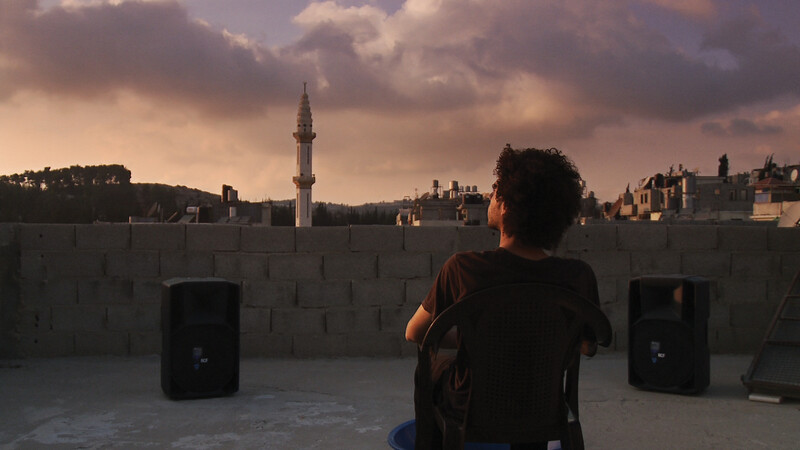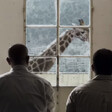The Electronic Intifada 6 November 2013

A scene from My Love Awaits Me By The Sea.
In 2003, Hassan Hourani, a rising star of Palestinian art, drowned in the sea off Jaffa, aged just 29. Having trained in Baghdad, exhibited across the Middle East as well as in South Korea and the United States and lived in Palestine and New York, he had returned to Ramallah in the occupied West Bank and made a brief trip to Jaffa in present-day Israel with his nephew and friends.
Among the works Hourani left behind was the text of a book of children’s stories titled Hassan Everywhere. The fantastical tales of Rihan, who roams the world in search of love, were published along with assembled drawings from Hourani’s partly-finished artwork in 2004.
It is these tales — of clouds, fish, birds and breezes — which frame Mais Darwazah’s film My Love Awaits Me By The Sea. Hassan/Rihan becomes the guide for Mais the director, artist and narrator as she travels on a wistful, sparkling, melancholy journey through the landscapes of Palestinian youth, their dreams, fears and hopes.
The people Mais speaks to on the journey include a youth in a Damascus refugee camp, preparing to get married and leave the “suffocating” atmosphere of closely-packed houses and Bashar al-Assad’s secret police.
In the West Bank village of Bilin, we meet young men working in a bakery, the bustle of the shop juxtaposed with the martyr poster of Bassem Abu Rahmah, killed ten days earlier by a high-velocity tear gas canister fired by an Israeli soldier.
And on a hot night outside the walls of the Old City of Jerusalem, we meet three young men who speak of their love for the city and its meaning for them but also of their preference for the occupation which humiliates and oppresses them, rather than the one that pretends to be benign. At least the Israeli soldier who shouts and insults them is honest, they say, unlike the one who smiles but continues to colonize their land.
“Romanticism is a struggle”
We also meet a young Palestinian couple, one raised in Israel and the other in Canada, working out how to raise their child under occupation. “Romanticism is a struggle,” insists husband Nael. Far from being escapism, for him it represents a constant resistance against the grind of oppression — which will be vindicated one day when “eventually the normal changes.”
For his wife Leila, meanwhile, Palestine is like an abused woman, and her hope — and fear — is for the day when Palestine must make the choice of all damaged people, of whether to be bitter or to rise above the hurt imposed by others. “There are things that are missing that will never come back” to Palestinian culture and society, she admits, and the challenge will be for Palestinians post-occupation to find a way to rebuild with what is left.
And for a young artist living near Israel’s wall in the West Bank, the concern is how Palestinians will remove the internal walls that have been built inside them, as they perforce adapt themselves to the ones built around them. “I fear the circles [of the wall] are now inside us … We’d need years to remove the wall from inside us.”
Interspersed between these highly individual, personal meditations on Palestine, its memories and its future, are Darwazah’s live drawings of the landscapes and sea she and Hassan are traveling through, and her narration of the elegantly formal Arabic of his children’s tales.
On the one hand, the inclusive, innocent message of the stories paints a portrait of a world of love and beauty. A fish in the sea and a bird in the air can fall in love, even if they are only united for a single kiss snatched between their different worlds.
Old magic
On the other, the tale of Hourani himself, and his untimely death, serve as a metaphor throughout the film; the desire for the sea is a constant refrain through much Palestinian literature and art, but both the words of some of Darwazah’s interviewees and Hourani’s fate itself provide a warning. Perhaps attaining one’s dreams can be dangerous — whether because they fail to meet one’s expectations, or because the experience of doing so is so great as to be overwhelming.
When Darwazah herself reaches Jaffa, these two possibilities both present themselves. The first locals she meets laugh at her, incredulous at the idea of any of the famous orange groves still standing, or that the “bride of the sea” — a traditional name for Jaffa — might still possess any of the beauty suggested by the old photos Darwazah presents us with.
But other Palestinians of Jaffa insist that the old magic is still there, and as suggested by Hourani’s simple children’s fables, it is perhaps in the innocence of youth that magic is truly to be found.
Ultimately, this is a film about the accommodations and choices that we all — but especially those living with exile or occupation — have to make, between dreams and daily life, and the risks that following dreams sometimes entails.
Will Palestine and her people manage to deliver on the dream, if they have the chance to seize it, or, like Hourani, will the dream remain be taken by the sea “to a distant place I can’t reach?”
Sarah Irving is a freelance writer. She worked with the International Solidarity Movement in the occupied West Bank in 2001-02 and with Olive Co-op, promoting fair trade Palestinian products and solidarity visits, in 2004-06. She is the author of a biography of Leila Khaled and of the Bradt Guide to Palestine and co-author, with Sharyn Lock, of Gaza: Beneath the Bombs.





